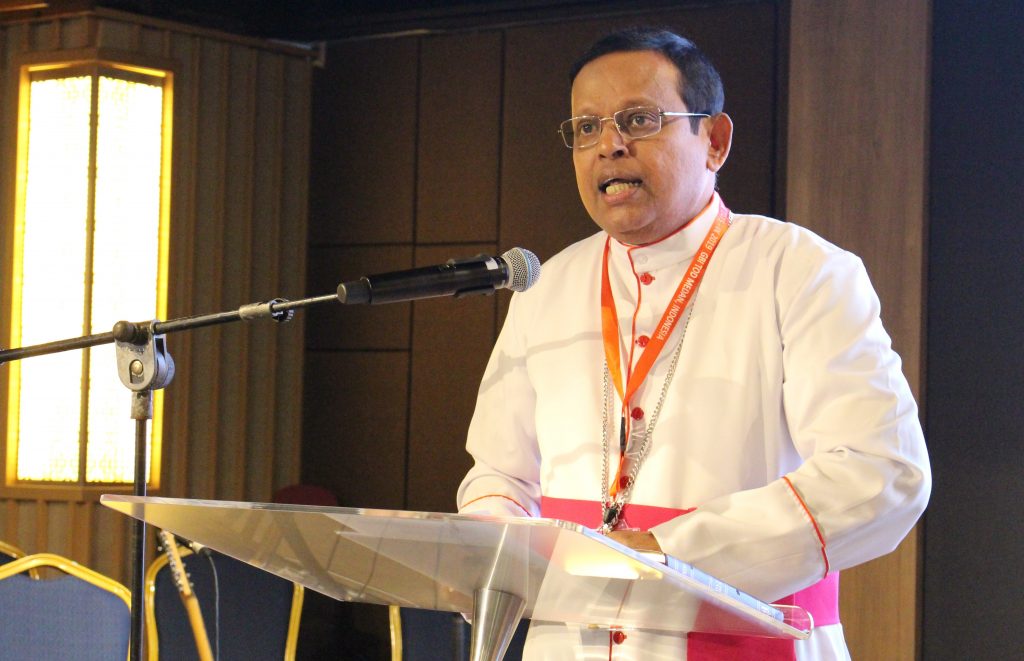Asian theologians must wrestle to develop a contextual theology of renewal and fullness of life, says Bishop Thiagarajah at CATS-IX

“Asian theologians need to develop a more relevant theology in order to address the burden of poverty and injustices, and lead communities towards renewal and the fullness of life in congruence with being people reconciled in Christ,” said Bishop Dr Daniel Thiagarajah.
Delivering the third thematic presentation at the Congress of Asian Theologians’ Ninth Summit (CATS-IX), Bishop Thiagarajah presented the image of ‘the powerlessness of Christ crucified’ as hope for Asia’s marginalized communities. “Christ,” he said, “did not judge people for their lack of theological acumen or insight, but accepted them as they are: hopeless and helpless.”
In his presentation on ‘Renewal: Towards the Fullness of Life’, Bishop Thiagarajah shared his deeply personal experience as a Tamil bishop in Sri Lanka, and the challenges that he and his community face in achieving the fullness of life. Despite the constant threats of death, of the violence of war, and the sheer struggle for survival, Bishop Thiagarajah noted how the pastors celebrate the precious gift of life and use it as motivation in carrying out pastoral ministry.
Bishop Thiagarajah highlighted issues in the Western interpretation of the ‘indicative-imperative’ principle. Rather than an ‘individualist’ perspective, and he recommended adopting a ‘community’ perspective.
“A narrow view of the principle of saving grace can lead to ‘a distorted interpretation of the individual believer’s ethical response’, which may result in an individualistic world-dominating hubris that relegates the reality of political, economic, and social forces to a distant background. Such flaws in Western theology fall short in addressing the issues of Asian churches”, he said.
Bishop Thiagarajah then drew attention to the ‘paradox in knowing the fullness of life in God in the midst of fear, violence, and suffering’. He emphatically stated, “My pastors don’t believe they were saved from death by their faith. But they do understand that God was with them in their hour of need, and in the unfathomable mystery of grace, has called them to faith. Their lives are not based on knowing and understanding a theological principle. But they do know their lives were renewed and their faith in God has been deepened beyond measure. This paradox of being crushed and weighed down by the sin and evil of the world is a reality that exists alongside the power of Christ’s renewing and resurrection life in our church.”
Bishop Thiagarajah’s presentation incited a flurry of comments from the CATS-IX participants.
The moderator for the session, a Japanese Roman Catholic priest Joseph Hamada, said that the presentation was ‘extremely touching’. “Western theological perspectives are easily relatable to societies where the interpreting community is the majority and has strong bonds to power structures. In Asia, the dynamics of the Christian minority with larger society is quite different. It is in the powerlessness of Jesus Christ on the cross from which we derive the power to proclaim the gospel.”
Rev. Oinike Natalia Harefa from Indonesia placed the idea of ‘fullness’ in a relational perspective. She asked, “What does ‘fullness’ of life indicate to those in positions of privilege, and what does ‘emptiness’ mean for those systemically deprived of justice?”
Rev. Dr Ji Zhang from Australia succinctly expressed, “Our suffering and experience becomes the sources for our contextual theology. Asian theologians need to speak to dominant discourse. The mission is no longer to the margins, but from the margins.”
Bishop Thiagarajah finally concluded by calling upon all the participants of CATS-IX to ‘speak truth to power’ in their local contexts.










